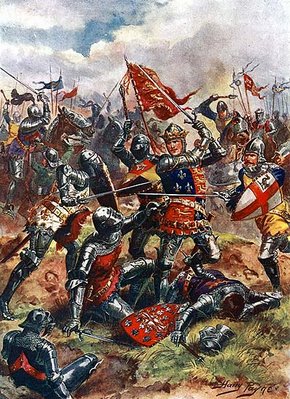KING HENRYThis is not the whole quote (I did a little editing to make it easier to read), but I think it clearly shows Henry's ideas on the matter, which to me do not logically follow. For one thing, the examples that he uses are completely different things. Sorry Henry, but a master sending his servant on an errand is not the same as leading an entire nation to war. To me, just because a bishop tells you that you have claim to the throne of France through an obscure and highly debatable law is not enough to support a declaration of war. In the time of Henry V, every man was subject to the king, and he was responsible for their lives if he led them to an early death because of an ill-conceived plan to seize the French crown.So, if a son that is by his father sent about merchandise do sinfully miscarry upon the sea, the imputation of his wickedness, by your rule, should be imposed upon his father that sent him. Or if a servant, under his master’s command transporting a sum of money, be assailed by robbers and die in many irreconciled iniquities, you may call the business of the master the author of the servant’s damnation. But this is not so. The king is not bound to answer the particular endings of his soldiers, the father of his son, nor the master of his servant, for they purpose not their death, when they purpose their services.....Every subject’s duty is the king’s, but every subject’s soul is his own.
I wanted some scholarly research to back up my ideas, and I found an article, "The Problem of Henry V." Here is the abstract, to give a you a good idea of what it is arguing:
This gave me more insight into Shakespeare's world, that it was possible that he believed Henry V to be a capable leader, but one without a worthy cause. I really enjoyed this article, because it gave me solid evidence for what I had already been thinking about Henry.This paper argues that though Shakespeare set out to write a play which reflected the uncritical celebration of Henry V as a warrior hero, he was able to do so only superficially. The commitment to truth characteristic of the greatest artists ensured that his depiction of Henry was very different from what it appeared to be on the surface. Shakespeare simply knew too much. He was clearly aware, for example, that Henry could have no valid claim on the French throne, as he had no de jure right even to the English one being the son of a usurper and that therefore his attack on France was an unprovoked war of conquest. The tension between Shakespeare the patriotic Elizabethan and Shakespeare the supreme artist is nonetheless compatible with the play being an organic whole as it is a paradigm of a widespread and persistent cultural ambivalence about war. Henry V is very much a play for our times, and we have only recently been in a position to be aware of its complexity and greatness.
Modern Application: Although I do not think that Henry as a person compares with Adolph Hitler, I did see a connection in the idea of responsibility. Hitler led Germany and the rest of the world to war when he set in motion his extremist government and invaded his neighboring countries without provocation. The world generally holds Hitler responsible for many of the deaths in World War II, because without his actions it may have never happened. I saw a similarity in Henry V. Like Hitler, Henry had a personal agenda that he used his position to achieve. Could he also be called a war criminal for his declaration of war without just cause? It may sound outlandish, but I think the idea has some merit.
Works Cited
Pittock, M. "The Problem of Henry V." Neophilologus. 93. 1 (2009): 175-190. Web.
